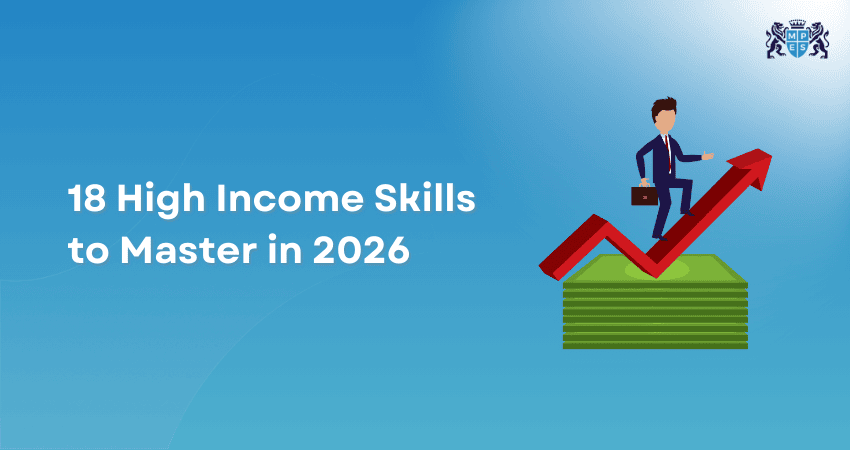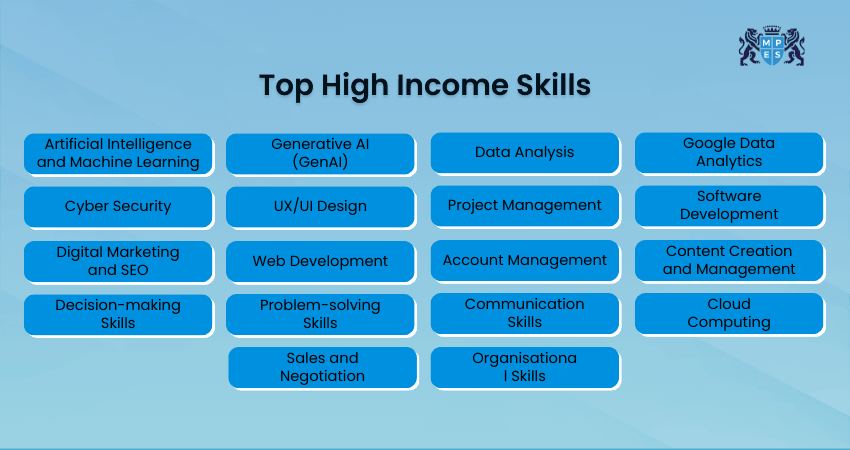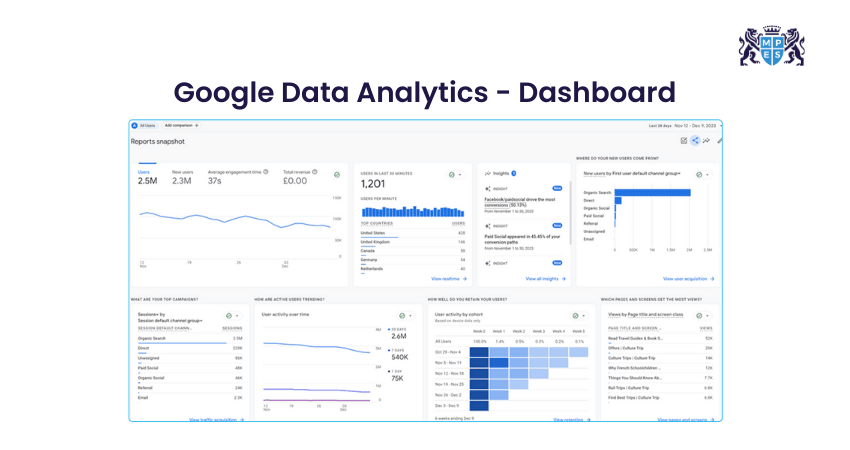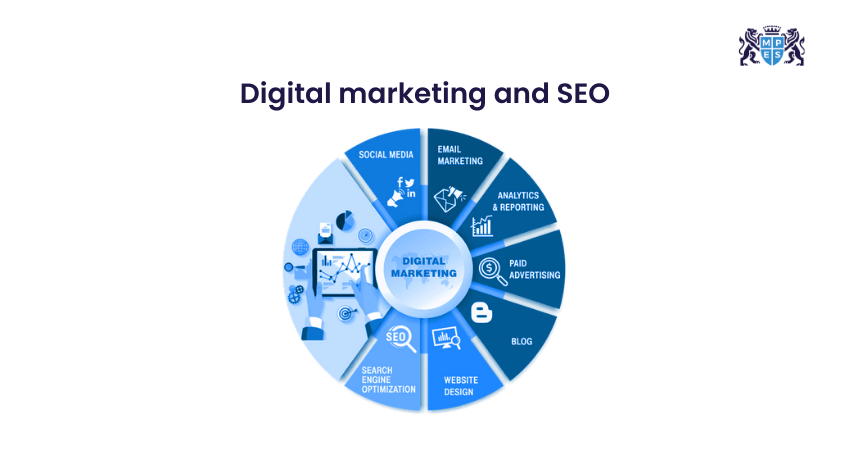Table Of Contents


It goes without saying that careers evolve faster than ever. This means mastering in-demand, High Income skills isn’t just an advantage; it’s a necessity. These skills are no longer limited to traditional degrees. They reward creativity, strategy and real-world impact more. If you are seeking some guidance on which career to pursue, you've come to the right place.
From tech-savvy expertise to persuasive communication, the right skills can put you ahead of the curve and make profitability your new reality. This blog explores the 18 best High Income Skills that drive future-proof careers and open doors to exciting opportunities. So, read on and fuel your entrepreneurial success!
What are High Income Skills in 2026?
High Income Skills refer to in-demand, specialised capabilities that attract premium pay in today’s job market. This often means reaching six figures annually. Rather than depending solely on formal qualifications, these skills are prized for their measurable contribution to business performance and revenue growth. High Income Skills broadly fall into three key groups:
1) Technical Skills: These are applied to solve complex challenges, such as Coding, Data Analysis and Cyber Security.
2) Leadership Skills: These are centred on guiding people and strategy, such as Project Management and effective communication.
3) Creative Skills: These are focused on innovation and growth, including Digital Marketing and User Experience (UX) Design.
18 High-Income Skills to Learn in 2026
Want to earn more and stay in demand? These 18 High Income Skills will help you grow your career, boost your value and succeed in the years to come.
1) Artificial Intelligence and Machine Learning
AI and ML are reshaping the future of work, making them two of the most valuable High Income Skills to learn today.
What It Is
Artificial Intelligence (AI) simulates human intelligence in machines programmed to think and learn. Machine Learning (ML), a subset of AI, involves algorithms that learn from data to make predictions and decisions. These technologies allow systems to adapt to new inputs and perform tasks ranging from voice recognition to recommendation systems.
Why It Matters
AI and ML help businesses automate operations, analyse vast datasets quickly, and improve decision-making. They're the driving force behind innovations like virtual assistants, autonomous vehicles, and smart diagnostics in medicine.
Career Potential
With demand surging, roles such as Machine Learning Engineer, AI Researcher, and Data Scientist offer high salaries and global opportunities. Both tech giants and startups are investing heavily in this space.
Key Tools
Popular tools include Python, TensorFlow, Scikit-learn, Keras, and PyTorch. Frameworks like OpenCV, and platforms like Google AI and IBM Watson are also widely used.
2) Generative AI (GenAI)
Generative AI is transforming creativity by enabling machines to produce content that feels human-made.
What It Is
Generative AI refers to AI models that create new content, such as text, images, music or code, by learning patterns from existing data. These models are trained on vast numbers of datasets and can mimic creativity, producing human-like responses and visuals.
Why It Matters
GenAI is disrupting industries by speeding up content creation, improving design processes and supporting creative ideation. It's being adopted in marketing, media, Software Development and education.
Career Potential
Professionals who understand GenAI can work in creative tech roles like Prompt Engineer, AI Content Strategist, or Innovation Consultant. Companies seek people who can fine-tune or apply models like GPT and DALL·E to solve business challenges.
Key Tools
Key platforms include ChatGPT, DeepSeek, Gemini, Runway ML, and tools like Midjourney and Adobe Firefly. Technical skills in NLP, Deep Learning and API integration are helpful.
Your words can close deals with finesse. Sharpen your negotiation skills and seal success with our Negotiation Skills Training - Sign up now!
3) Data Analysis
In a data-driven world, the ability to extract insights from numbers is a must-have High Income Skill.
What It Is
Data Analysis is the process of gauging datasets to uncover useful information, draw conclusions, and support decision-making. It involves statistical techniques, data cleaning and visualisation.
Why It Matters
Data Analysis helps companies spot trends, improve customer experience, and make informed business choices. From sales forecasting to healthcare diagnostics, data drives strategy.
Career Potential
Roles include Data Analyst, Business Analyst and Operations Analyst. Industries like finance, e-commerce, healthcare and logistics all depend on Data Analysts to stay competitive.
Key Tools
Essential tools are Excel, SQL, R, Python (Pandas, NumPy), Power BI, and Tableau. Google Sheets and Looker are also commonly used in web-based environments.
4) Google Data Analytics
This beginner-friendly certification is a smart first step into the growing field of Data Analytics.

What It Is
Google’s Data Analytics Certificate provides foundational training in Data Analysis. It focuses on real-world tools and techniques such as spreadsheets, SQL, Tableau, and R programming.
Why It Matters
This certificate is ideal for beginners and career switchers. It teaches problem-solving with data, making it easier to enter analytics roles with no prior experience.
Career Potential
Completing this course can open entry-level roles in analytics and Business Intelligence. Employers see it as proof of job readiness and practical skill.
Key Tools
Learners work with Google Sheets, BigQuery, SQL, Tableau, and R. The course also builds familiarity with workplace data challenges and reporting strategies.
5) Cyber Security
With digital threats soaring, Cyber Security stands out as one of the most crucial skills of the decade.
What It Is
Cyber Security refers to the cutting-edge practice of defending servers, computers, mobile devices, networks and data from digital attacks. These cyberattacks often aim to access, change or destroy sensitive data, interrupt business operations, or extort money.
Why It Matters
As digital transformation grows, so do threats. Cyber Security ensures the confidentiality and availability of information. From ransomware to phishing, every business is at risk without skilled security professionals.
Career Potential
Cyber Security specialists, Penetration Testers, Security Analysts and Risk Managers are in high demand globally. With certifications, professionals can grow into high-level roles with strong job security.
Key Tools
Key tools include Wireshark, Metasploit, Kali Linux, Nessus, Splunk, and firewalls like Palo Alto. Certifications like CompTIA Security+, CEH, and CISSP are also valuable.
6) UX/UI Design
Creating seamless digital experiences makes UX/UI design a key skill in today’s product-driven economy.
What It Is
UX/UI Design focuses on the look, feel and usability of digital products. User Experience (UX) is about how users interact with products, while User Interface (UI) concerns the design and aesthetics of those interactions.
Why It Matters
Good design improves customer satisfaction, increases product adoption, and reduces churn. It plays a vital role in mobile apps, websites, and Software Development.
Career Potential
Demand is rising for UX/UI Designers, Product Designers, and Interaction Designers. These roles are critical in tech, e-commerce, healthcare, and education sectors.
Key Tools
Popular tools include Figma, Adobe XD, Sketch, InVision, and usability testing software. Learning design principles, wireframing, and prototyping is essential.
7) Project Management
Bringing structure to chaos, Project Management is essential for delivering results on time and within budget.
What It Is
Project Management involves starting, planning, executing and closing work to meet goals within time and budget. It blends leadership, communication and logistics.
Why It Matters
It ensures business objectives are met efficiently. Skilled Project Managers help avoid delays, reduce risk, and ensure stakeholder satisfaction.
Career Potential
Certified PMs can pursue roles like Scrum Master, Agile Coach, or Portfolio Manager in tech, healthcare, or construction. Project Management roles offer high earning potential and growth.
Key Tools
Tools include Trello, Asana, Jira, Microsoft Project, and tools related to Agile and PRINCE2 methodologies.
8) Software Development
Building the apps and systems that power the digital world, Software Development remains a top-tier skill.
What It Is
Software Development involves designing, coding, testing, and maintaining applications or systems. It powers websites, apps, and tools we use daily.
Why It Matters
Digital solutions are essential for modern life. Software devs solve problems and build technology used in business, education, entertainment, and healthcare.
Career Potential
Career paths include Front-End/Back-End Developer, Full Stack Developer, Mobile App Developer, and DevOps Engineer. The demand continues to grow with the digital economy.
Key Tools
Languages like Python, Java, JavaScript, frameworks like React, Django, and tools like Git, Docker, and VS Code are essential.
9) Digital Marketing and SEO
Digital visibility is everything marketing and SEO skills help businesses reach and retain customers online.

What It Is
Digital marketing uses online channels to promote products or services. Search Engine Optimisation (SEO) focuses on improving visibility in search engine results.
Why It Matters
Digital presence is critical for brand awareness, leads, and conversions. SEO boosts organic traffic and builds long-term growth.
Career Potential
You can pursue roles like Digital Marketing Manager, SEO Specialist, Content Strategist, and Social Media Analyst.
Key Tools
Google Analytics, SEMrush, Moz, Ahrefs, Google Ads, and content scheduling tools like Buffer or Hootsuite.
Take control of your time - boost focus, efficiency, and success in every area with our Time Management Training now.
10) Web Development
Every business needs a website Web Development is the skill that brings digital ideas to life.
What It Is
Web Development refers to the process of creating and maintaining websites and web applications. It involves coding, server-side scripting, and User Interface Development.
Why It Matters
Every business needs a website. Web Developers build digital storefronts and tools that help companies reach their audience online.
Career Potential
Opportunities include Front-End Developer, Full Stack Developer, and Web Architect. Remote work options are plentiful.
Key Tools
Languages: HTML, CSS, JavaScript. Frameworks: React, Angular, Node.js. Other tools: GitHub, Netlify, and Chrome DevTools.
11) Account Management
Account Management builds lasting client relationships, making it a cornerstone of business success.
What It Is
Account Management focuses on nurturing relationships between businesses and their clients. It involves client communication, strategy, and post-sales support.
Why It Matters
Satisfied clients lead to repeat business and referrals. Account Managers ensure clients’ goals are met, fostering loyalty.
Career Potential
Careers include Account Executive, Client Success Manager, and Strategic Account Manager. It's essential in agencies, B2B sales, and consultancy.

Key Tools
Customer Relationship Management (CRM) tools like Salesforce, HubSpot, Zoho; communication tools like Slack and Zoom; and data platforms like Tableau.
12) Content Creation and Management
From blogs to videos, content creation is how brands connect, engage, and convert audiences.
What It Is
Content creation involves producing digital material like blogs, videos, podcasts, or graphics. Content Management is the organisation and distribution of this content across platforms.
Why It Matters
High-quality content engages audiences, builds trust, and improves SEO rankings. Brands use content to educate, entertain, and convert.
Career Potential
Roles include Content Creator, Content Strategist, Copywriter, and Brand Manager. There’s high demand in marketing, media, and education.
Key Tools
Tools include Canva, WordPress, Adobe Creative Suite, Grammarly, Hootsuite, and CMS platforms like Drupal.
13) Decision-making Skills
Smart, confident decision-making drives leadership and business success across any industry.
What It Is
Decision-making is the process of making choices by identifying options and selecting the best course of action. It includes logical reasoning and emotional intelligence.
Why It Matters
Strong decision-making reduces risks and increases efficiency. It's vital in Crisis Management, leadership, and daily operations.
Career Potential
Applicable across industries in managerial, leadership, and consulting roles. High-quality decision-makers are often promoted to senior positions.
Key Tools
Tools include SWOT analysis, decision matrices, KPIs, dashboards like Power BI, and strategic planning frameworks.
14) Problem-solving Skills
The ability to tackle challenges creatively is what separates good professionals from great ones.
What It Is
Problem-solving involves identifying issues, analysing causes, and implementing solutions. It builds logical thinking, creativity, and adaptability.
Why It Matters
Problem-solvers reduce downtime, improve efficiency, and lead innovation. It’s essential for roles in IT, operations, and leadership.
Career Potential
Critical for advancement into leadership and specialist roles. Common in roles like Consultant, Project Manager, and Engineer.
Key Tools
Brainstorming, root cause analysis, flowcharts, Six Sigma, and decision trees.
15) Communication Skills
Strong communication builds trust, fosters collaboration, and empowers teams to perform their best.
What It Is
Communication includes verbal, non-verbal, and written exchange of information. It enables collaboration and leadership.
Why It Matters
Effective communication improves relationships, productivity, and conflict resolution. It supports teamwork and trust.
Career Potential
Strong communicators thrive in management, sales, customer service, and leadership roles.
Key Tools
Email, Slack, Zoom, presentation software, and feedback platforms.
16) Cloud Computing
Cloud Computing powers the digital backbone of modern businesses, making it a must-have tech skill.
What It Is
Cloud Computing delivers services like storage, servers, and databases over the internet, replacing traditional infrastructure.
Why It Matters
It enables flexibility, scalability, and cost savings. Businesses run apps, store data, and recover systems on the Cloud.
Career Potential
Cloud Architects, Cloud Engineers, and DevOps professionals are in high demand. Certifications lead to lucrative roles.
Key Tools
AWS, Microsoft Azure, Google Cloud Platform, Docker, Kubernetes, Terraform, and CI/CD tools.
17) Sales and Negotiation
Sales and negotiation are core business skills that directly influence growth and revenue.
What It Is
Sales involves offering solutions to customers; negotiation secures favourable terms. Both require persuasion and strategy.
Why It Matters
It directly impacts business revenue. Strong negotiation closes deals and resolves conflicts effectively.
Career Potential
High potential in B2B, tech, real estate, and entrepreneurship. Roles: Sales Executive, Negotiator, Business Development Manager.
Key Tools
CRM systems (Salesforce, Pipedrive), negotiation frameworks, email automation, and analytics platforms.
18) Organisational Skills
Staying organised means staying productive. This underrated skill drives efficiency and balance.
What It Is
Organisational skills help prioritise tasks, manage time, and coordinate resources effectively. It boosts productivity and focus.
Why It Matters
Good organisation reduces errors, lowers stress, and enhances work-life balance. It’s essential in leadership and admin roles.
Career Potential
Useful in every career path, especially in project coordination, remote work, and management.
Key Tools
Task Managers (Notion, Asana), time tracking apps, calendars, and File Management systems.
Fuel your ambition and achieve goals faster with our Motivation and Goal Setting Training - join now!
How Do You Develop High Income Skills?
Developing High Income Skills is essential for career progression and long-term earning stability. As the demand continues to rise, there are many High Income Skills to focus on and here’s how to build them:
1) Identify In-Demand Skills
1) Start by researching which High Income Skills are most sought after.
2) Understanding market trends helps you set a clear direction and align your efforts with real opportunities.
3) Explore growing sectors such as technology, finance, or specialised trades to pinpoint skills with strong demand.
2) Set Learning Goals
1) Once you identify profitable skills to learn, set realistic and measurable learning goals.
2) For example, if coding appeals to you, choose a widely used programming language and commit to structured learning.
3) Clear goals can improve focus, consistency and outcomes.
4) If you’re exploring jobs for 19-year-olds with no experience, many practical roles provide valuable skills, decent pay and a strong foundation to build expertise early.
3) Choose the Right Learning Platforms
1)The UK offers a wide range of online courses and training options. Selecting the right platform is key.
2) Look for providers offering high-quality, industry-relevant courses that align with your goals and effectively support skill development.
4) Practical Application
1) Putting theory into practice accelerates learning and builds confidence.
2) Gain hands-on experience through projects, internships or real-world tasks.
3) Practical application strengthens creativity, problem-solving and readiness for workplace challenges.
5) Network and Seek Mentorship
1) Connecting with industry professionals opens doors to new opportunities and insights.
2) Mentors can help you stay focused, avoid common mistakes and accelerate progress.
3) Strong networks often lead to guidance, collaboration and career growth.
6) Continuously Update Your Skills
1) To stay competitive, continuous learning is essential.
2) Industries evolve quickly, particularly in technology.
3) Regularly updating your skills ensures they remain relevant and in demand.
7) Showcase Your Skills
1) Employers often review online profiles and portfolios.
2) Present your skills through a professional portfolio, personal website or platforms like LinkedIn.
3) A strong showcase demonstrates your achievements, adaptability and growth potential.
8) Seek Feedback and Improve
1) Actively seek feedback and use it to refine your abilities.
2) Learning from constructive criticism helps identify gaps and drive professional growth.
3) Embracing feedback reflects maturity and supports long-term career development.
Conclusion
Mastering High Income Skills is more of an investment in your future earning power. By choosing skills that align with market demand and personal strengths as outlined in this blog, you create lasting opportunities for flexibility and success. So, start learning today and turn your expertise into meaningful, long-term profitability.
Start your journey to success through powerful personal development and leadership-building strategies with our Personal Development Courses now.
 Have Any Question?
Have Any Question?
 +44 7452 122728
+44 7452 122728






 Back
Back








 44 7452 122728
44 7452 122728





